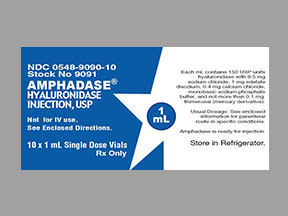
Amphadase Coupons & Savings Card – Discount Prices from $38.93
My prescription
Edit
10 solutions 1ML of 150UNIT/ML, Amphadase (1 Vial)
Select pharmacy

CVS
$74.84
COUPON PRICE
Walmart
$38.93
COUPON PRICE
Walgreens
$49.92
COUPON PRICE
Albertsons
$58.26
COUPON PRICEAmphadase savings card
Show this card to your pharmacist
Walmart
$38.93
BIN
ID
PCN
GRP
019876
LH6DADE130
CHIPPO
LHX
Powered by
Price history for Amphadase
1 Vial, 1ML of 150UNIT/ML
Average retail price for Amphadase
Average SaveHealth price for Amphadase
Our price history data is based on aggregated prescription data collected from participating pharmacies in America. Our prescription data updates daily to reflect the latest price changes. If you notice a missing data point, it means there wasn't sufficient data available to generate a monetary value for that date.
*Retail prices are based on pharmacy claims data, and may not be accurate when we don't have enough claims.
Amphadase dosage forms
Dosage Quantity Price from Per unit 1ML of 150UNIT/ML 1 Vial $38.93 $38.93 1ML of 150UNIT/ML 2 Vials $96.85 $48.42 1ML of 150UNIT/ML 3 Vials $154.77 $51.59
| Dosage | Quantity | Price from | Per unit |
|---|---|---|---|
| 1ML of 150UNIT/ML | 1 Vial | $38.93 | $38.93 |
| 1ML of 150UNIT/ML | 2 Vials | $96.85 | $48.42 |
| 1ML of 150UNIT/ML | 3 Vials | $154.77 | $51.59 |
What is amphadase used for?
Amphadase is used as an adjuvant to increase the absorption and dispersion of other injected drugs. It is also used to facilitate the subcutaneous administration of fluids and to improve the resorption of radiopaque agents in subcutaneous urography.
What is hyaluronidase used for?
Hyaluronidase is an enzyme used to enhance the absorption and dispersion of other injected drugs. It is also used to manage the effects of hyaluronic acid fillers, such as in cases of overcorrection or complications. Additionally, it can be used to improve the effectiveness of subcutaneous fluid administration in cases of dehydration.
How to administer Amphadase?
Amphadase should be administered by a healthcare professional. It is typically given as a subcutaneous injection. The healthcare provider will determine the appropriate dosage and injection site based on the patient's specific needs and medical condition. It is important to follow the healthcare provider's instructions carefully when administering this medication.
What is the difference between Amphadase and Vitrase?
Amphadase and Vitrase are both formulations of hyaluronidase, an enzyme used to facilitate the dispersion and absorption of other injected drugs. The primary difference between them lies in their source and formulation. Amphadase is derived from bovine (cattle) sources, while Vitrase is derived from ovine (sheep) sources. This difference in origin may be relevant for patients with specific allergies or sensitivities to animal-derived products.
What is the generic name for Amphadase?
The generic name for Amphadase is hyaluronidase.
